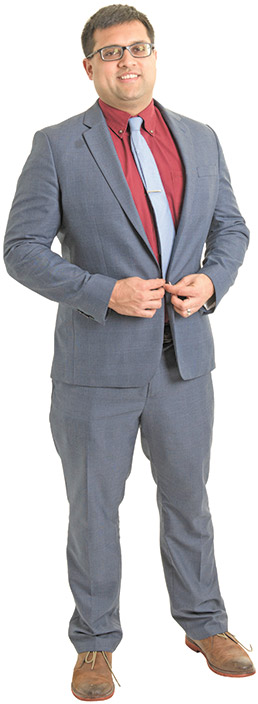Subscriber Benefit
As a subscriber you can listen to articles at work, in the car, or while you work out. Subscribe NowJay Chaudhary is a visionary who thinks strategically about program development. He was instrumental in establishing the concept of medical-legal partnership in Indiana, which serves the legal needs of numerous clients who are also involved in the health care system. In 2009, he founded the Midtown Medical-Legal Partnership, which works with clients who have mental and developmental disabilities. He directs MMLP, which was honored with the Outstanding Medical-Legal Partnership award from the National Center for Medical- Legal Partnership in 2015.
 (IL photo/Eric Learned)
(IL photo/Eric Learned)Why did you create the medical-legal partnership? Has it become what you envisioned?
It was a mix of desperation and serendipity. I was a 3L at Maurer and needed a job, and was working as an extern at ILS. ILS told me that, while they could not hire me, they would match any money I found to create a position. My clinical professor at Maurer, Carwina Weng, was familiar with the MLP model from her time in Boston, where it originated, and she suggested MLP as a way to find grant funding. I got a small grant from the United Way of Central Indiana, and through another law school connection, started working with Midtown. Surprisingly, it has developed almost exactly as I had hoped. I hoped to turn a small grant into a bigger grant, and turn the bigger grant into sustainable funding, which is exactly what has happened.
You’ve been described as innovative and quick to embrace a new idea. Can you give an example in your work with ILS?
I have no hesitation about reaching out to someone who I think could offer something and seeing if working together makes sense. I probably make 40-50 of those connections a year, and that has made all the difference.
What was the most memorable job you had prior to becoming an attorney?
I made salads at Texas Roadhouse. I made about 400 a night. Needless to say, by the end, I was amazing at it.
What is the most important lesson you learned from your mentor?
If you have an idea, don’t assume that someone has already had it and is already working on it. They usually aren’t, at least not in the same way you would.
Where do you see yourself in 20 years?
I just hope to be fulfilling my potential as a parent, partner and professional.
What’s something about you not many people know?
My favorite musicians are Outkast, The Hold Steady, and My Morning Jacket.
What do you like the most about being an attorney? What do you like least?
I like working with other attorneys — I think we have a unique way of looking at the world. I don’t like cases where the parties are adversarial for the sake of being adversarial — I think I’m a collaborator and consensus-builder at heart.
Where do you see yourself in 20 years?
I just hope to be fulfilling my potential as a parent, partner and professional.
What civic cause is the most important to you?
Public health and education.
What will the legal profession look like in 15 years?
I imagine it will have been more democratized by technology. I hope there will still be a commitment to pro bono work.
If you couldn’t be a lawyer, what would you do for a living?
Something in the not-for-profit sector, ideally dealing with public health.
What are some tips for achieving a work/life balance?
Just be mindful of where you are and try to be present. When you are at work, you are at work. When you are with your kids, be a parent.
Please enable JavaScript to view this content.
